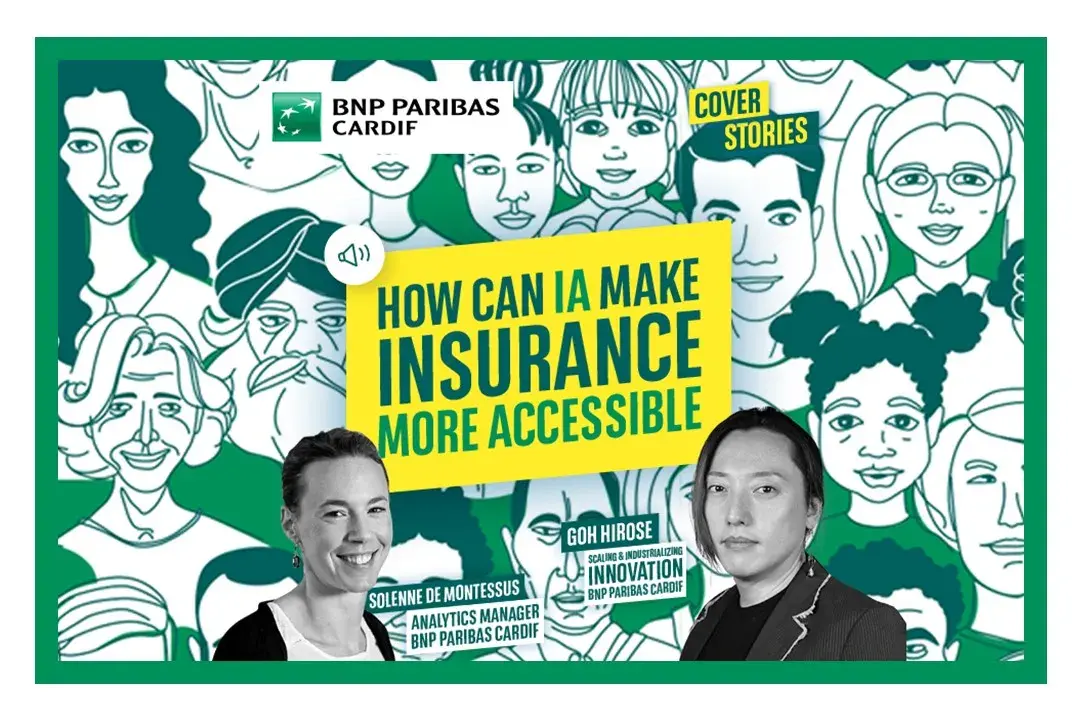February 09, 2024
How can artificial intelligence (AI) make insurance more accessible?
Capable of automating certain tasks and speeding up and improving decision-making with the help of machines, artificial intelligence (AI) is disrupting our work modes.
So, what is AI, and what is its purpose in the context of insurance? How is it revolutionizing the insurance sector and its various aspects?
Goh Hirose and Solenne de Montessus, explain how AI can make insurance more accessible, inclusive, and straightforward for consumers.
|
|
How would you define AI and its role in the field of insurance, including its relevance to customers?
Solenne de Montessus: AI cannot exhibit feelings and emotions and therefore cannot be defined as intelligence in the strict sense. It also requires statistics and data provided by humans to replicate simple and repetitive manual tasks, help humans understand certain trends, and facilitate their decision-making in the insurance sector. For example, for an algorithm to be able to find or recognize a cat in an image, we must first train it by exposing it to a large number of photos containing cats. While AI generates new risks and is sometimes seen as a threat, its use remains highly controlled. At BNP Paribas Cardif, for example, we have implemented specific governance tools to protect our customers and partners on this issue.
How is Artificial Intelligence changing the insurance sector, including the transformation of a company like BNP Paribas Cardif, and its impact on insurance policies and customer services?
Solenne de Montessus: At BNP Paribas Cardif, our goal is to use AI to make insurance more accessible. We develop AI solutions internally to improve our business processes, better understand our partners and customers, streamline their journeys, and provide them with the best possible experience. In the context of insurance claims, for example, we use AI to speed up the handling process and automate the verification of supporting documents, benefiting our commercial and personal customers. We also work closely with our partners to enhance their revenue through AI, helping them better target high-potential prospects, maximize conversion rates, or identify customers on the verge of canceling their policies. In the commercial sector, AI helps our company improve its operations and customer services. Company employees can also harness the power of AI to boost their productivity. For instance, our legal teams can use an AI-powered tool to easily access information and documents when needed.
AI increases employee productivity by automating some repetitive tasks. But is there a risk that AI will completely replace humans, particularly in the insurance sector?
Goh Hirose: I don't think we should fear technology in any form, and it seems very unlikely that AI will progress to the point of replacing humans in the insurance industry in the next few decades. The challenge is rather to find the right balance between human qualities and needs and what machines can do to help us work in a more efficient way, as illustrated by the examples provided by Solenne. AI offers advantages both externally for customers, such as reducing wait times in call centers and improving customer service, and internally for employees who can delegate certain repetitive tasks to machines and focus on more interesting and value-added work.
How can AI, including artificial intelligence and insurance, make insurance more accessible, considering various aspects such as health, personal needs, and the best help for customers?
Goh Hirose: AI allows us to go beyond the traditional insurance value chain. It's no longer just about providing the best coverage. We can think about how to help individuals and businesses prevent incidents or accidents and how to recover and rebuild more quickly. There are also many areas where AI can help us better tailor our products and services to individuals' needs and risks, providing the best help and compensation in case of unfortunate events.
Solenne de Montessus: All these considerations are already underway at BNP Paribas Cardif, where we focus on insurance, business operations, and benefits. In Latin America, our policyholders covered by a protection contract, for example, can receive personalized advice through AI, coaching sessions, help with CV writing, or online courses after a job loss.
How do you envision the future of insurance with artificial intelligence, considering its impact on financial aspects and the insurance industry as a whole?
Goh Hirose: In addition to bringing more efficiency, AI helps us provide better services to our customers, both in terms of financial aspects and the overall insurance industry. It allows us to improve data analysis, risk assessment, and anticipation, which are at the core of the insurance business. I believe that in the near future, insurance companies will fall into two categories:
● Those that use data analysis solely to prevent damages and save more money, benefiting both their company and their customers;
● And others like BNP Paribas Cardif, which use this information to make insurance more accessible, cover more people, and better support policyholders, offering them the best help and compensation when they need it the most.
Read more
Cover Stories: the podcasts making insurance more accessible!
BNP Paribas Cardif brings you “COVER STORIES”, a series of fascinating podcasts, illustrating, via concrete...
Podcast #4 : Comment rendre l'assurance emprunteur plus facile à souscrire et à utiliser ?
Voyagez avec nous dans ce monde en mutation. Rencontrons ceux qui inventent des solutions intelligentes qui...
How to make insurance more accessible to buyers of second-hand goods
BNP Paribas Cardif and SOFI Group have launched an app that facilitates access to insurance and warranty fo...





